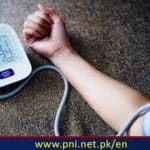ISLAMABAD, May 14 (Online): In a new study, researchers report that a higher metabolic score is associated with higher mortality from breast cancer. They added that obesity was associated with a higher incidence of breast cancer. They noted that a low-fat diet was found to reduce breast cancer mortality. In a new study, metabolic syndrome and obesity were shown to have distinct but different associations with breast cancer. A higher metabolic syndrome score was associated with higher mortality from breast cancer and obesity was associated with a higher incidence of breast cancer, according to a studyTrusted Source published today in the journal Cancer. In it, researchers looked at information on 63,330 women without prior breast cancer who received annual mammograms and were included in the Women’s Health Initiative to help determine the impact of obesity and metabolic syndrome on postmenopausal breast cancer. The study follow-up period was about 20 years. The study’s outcomes included breast cancer incidence, mortality, deaths after a breast cancer diagnosis, and hormone receptor status. During the study period, there were 4,562 cases of breast cancer and 2,073 deaths following a breast cancer diagnosis, and 659 deaths from breast cancer. At the start of the study, the scientists gathered information on: Body mass index (BMI) Metabolic score (0, 1-2, 3-4) that included waist circumference, blood sugar, blood pressure, and cholesterol Obesity, metabolic syndrome, and obesity At the end of their study, the researchers concluded that both metabolic syndrome and obesity impacted breast cancer. However, they reported there were significant differences. After adjusting for BMI, a higher metabolic score (3-4) was associated with more poor-prognosis estrogen-receptor (ER)-positive, progesterone receptor (PR)-negative breast cancers. A high metabolic score was also linked with 53% more deaths after a breast cancer diagnosis and 44% higher breast cancer mortality. After adjusting for metabolic score, obesity was associated with more breast cancers overall, including more good-prognosis ER-positive, PR-positive breast cancers. Obesity was associated with more deaths after a breast cancer diagnosis, with only women with severe obesity having higher breast cancer mortality. The researchers stated that a low-fat diet can reduce breast cancer mortality, especially in women with more metabolic syndrome components, such as obesity, high blood pressure, elevated blood sugar, and abnormal cholesterol. “Both obesity, as well as hypertension, diabetes, and high cholesterol, can increase the incidence of breast cancer,” said Dr. Parvin Peddi, a medical oncologist and the director of Breast Medical Oncology for the Margie Petersen Breast Center at Providence Saint John’s Health Center as well as an associate professor of medical oncology at Saint John’s Cancer Institute in California. “A composite score that takes into account the presence of hypertension, diabetes, high cholesterol, and high waist circumference (MetS) was associated with worse breast cancers (ER positive and PR negative).” “It likely means that obesity, if it has also led to hypertension, diabetes, and high cholesterol, is an even worse prognostic factor,” Peddi, who was not involved in the study, told Medical News Today. The authors noted that Black women have a higher prevalence of aggressive, triple-negative breast cancer and severe obesity. Targeting obesity and metabolic syndrome The scientists concluded that targeting obesity would have a more significant effect on breast cancer incidence and targeting metabolic syndrome would have a more substantial impact on breast cancer mortality. “This doesn’t mean that one is more important than the other,” said Dr. Jack Jacoub, a medical oncologist and medical director of MemorialCare Cancer Institute at Orange Coast Medical Center in California who was not involved in the study. “Both are important but in different ways,” Jacoub told Medical News Today. “This study shows that the parameters that we typically connect to cardiovascular disease – obesity, blood pressure, blood sugar, and cholesterol – are also related to cancer. There are many health variables that are not under our control – such as genes, but the metabolic components are. Diet, lifestyle, and medications can help control these factors.” The study confirms that both obesity and metabolic syndrome increase our “breast cancer health burden” but supports, at least in part, differential associations for each risk factor with regards to breast cancer outcomes, according to Dr. Douglas Marks, a medical oncologist and the medical director of the clinical trials office at NYU Langone Perlmutter Cancer Center–Long Island. “In addition to providing additional insight into the biology of breast cancer, these observations. may influence future pharmacologic and non-pharmacologic interventions,” Marks, who was not involved in the study, told Medical News Today. “Additionally, this study underscores that obesity and metabolic syndrome, which are not accounted for in many breast cancer risk prediction models, are important to consider when counseling patients regarding their breast health.” “While obesity appeared more closely related to breast cancer incidence vs. development of a higher risk breast cancer subtype, obese patients still did poorly following breast cancer diagnosis that their non-obese peers,” Marks said. “As such, both obesity and high metabolic syndrome are associated with greater ‘breast cancer health burden’ and neither should be discounted. That said, based on this data, efforts focusing on improving metrics associated with high metabolic syndrome may have the greatest impact specifically in reducing breast cancer mortality.” More reaction to the breast cancer risk study “This study reiterates the importance of preventative strategies,” Jacoub said. “I do think it matters less how we control them than keeping them controlled. The earlier, the better, and for as long as possible. We don’t yet have information on whether one approach is better than another. The length of follow-up in this study underlines the message.” “Primary care physicians and OB/GYNs are in the best positions to talk about prevention of breast cancer,” he added. “Typically, we don’t think about the prevention of cancer in terms of diet, but this study clearly shows that there are ways we can lower our risk of developing breast cancer.” “[Metabolic syndrome and obesity] lead to more cancers,” noted Peddi. “Metabolic syndrome leads to worse types of cancer, so [I] would focus on the latter if given the choice, but this is a false choice as they are very linked.” “Losing weight would affect breast cancer risk,” she added. “But, difficulties with losing weight should not dissuade women from controlling their glucose levels, blood pressure, and cholesterol with medications. Doing that will bring down the risk of worse types of breast cancer.”
Follow the PNI Facebook page for the latest news and updates.








